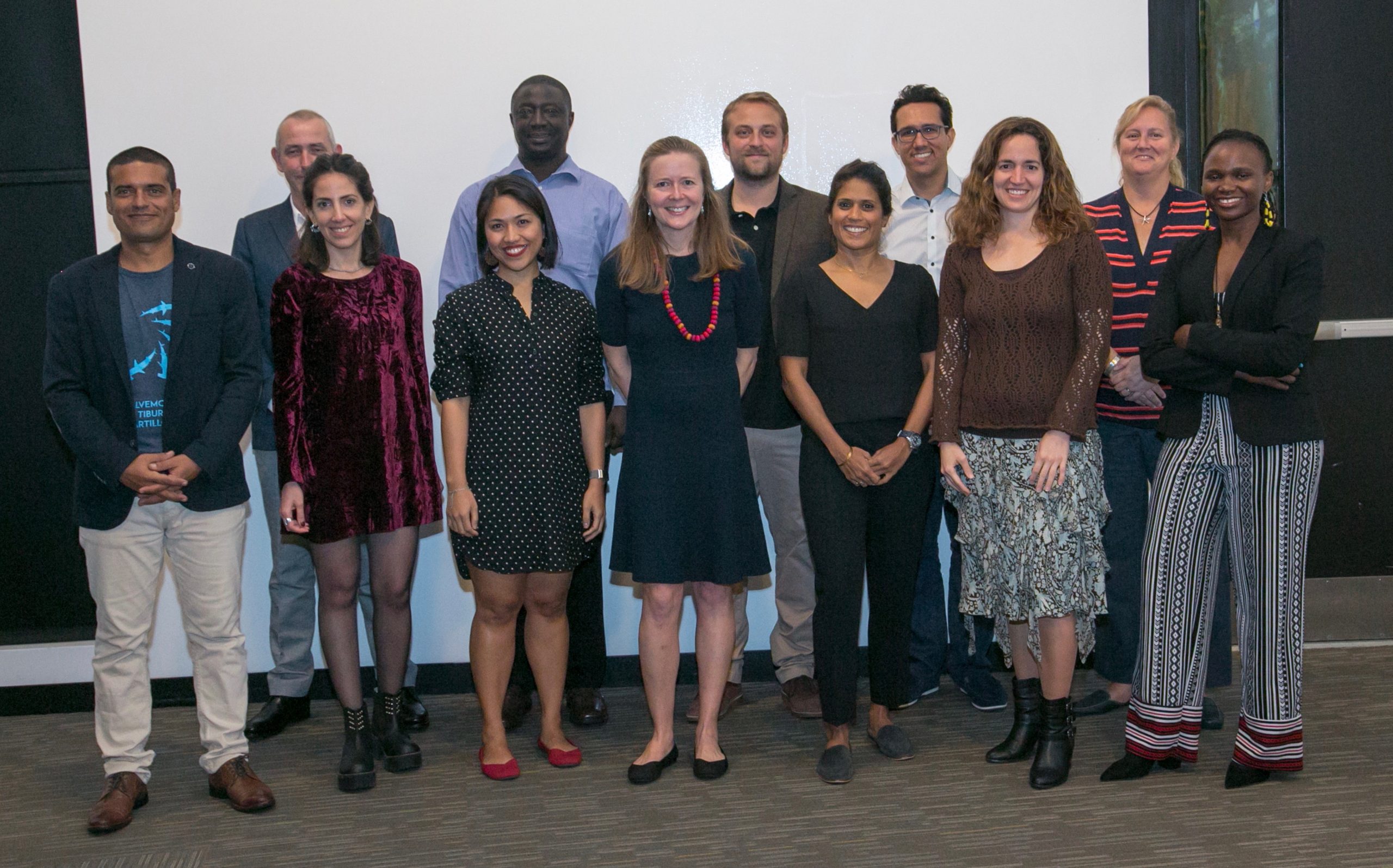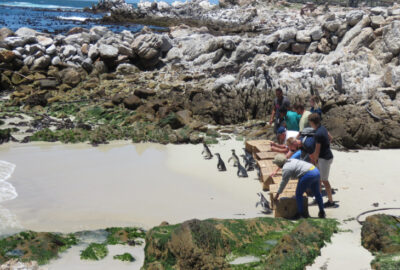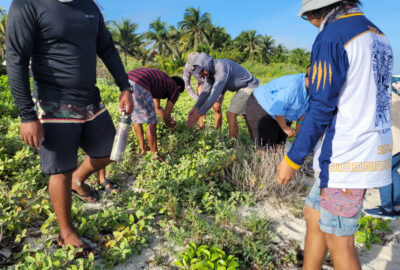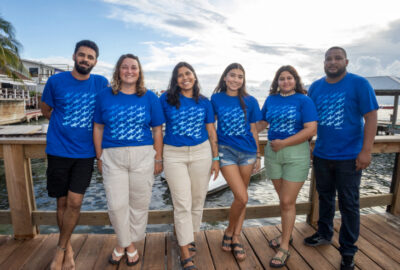Marine Conservation Action Fund (MCAF) 2022 Year in Review
By New England Aquarium on Friday, March 03, 2023


We are excited to share some of the stories that made this year such a success for the Fellows and Projects Leaders of the Marine Conservation Action Fund (MCAF). In 2022, MCAF issued a record high 18 grants and five fellowship awards, disbursing a total of 23 awards and over $246,000 for projects. MCAF was honored to support conservation efforts for a wide variety of species across 14 countries.
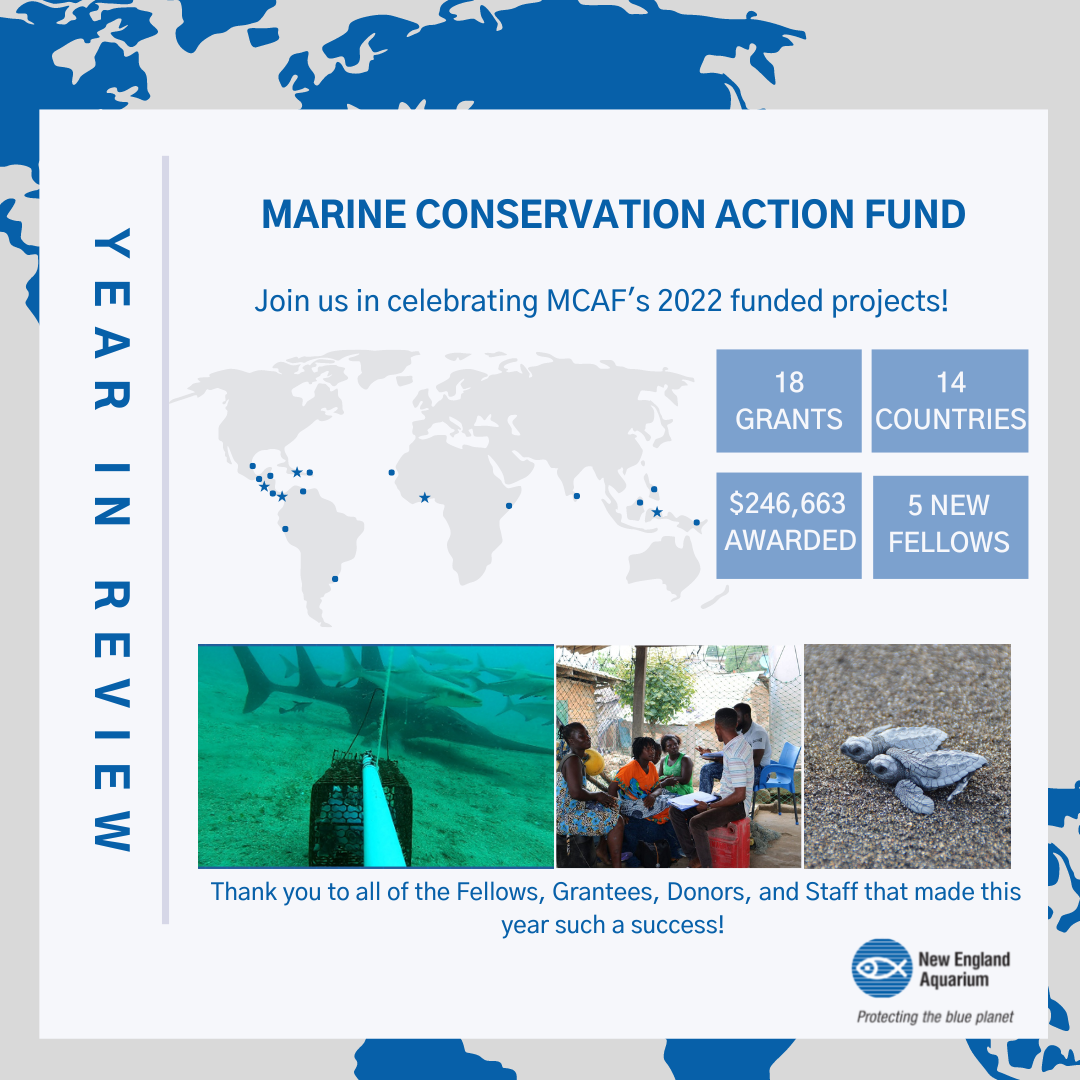
Saving Sea Turtles through Community-Based Projects
Sea turtles are a global species of concern, and MCAF was honored to help support efforts to study and protect these animals. Although sea turtles are expert nesters skilled at disguising their eggs under sand, predation and poaching rates of nests are high. With the support of MCAF, many local leaders continued their critical work to monitor sea turtle nests. Sylvania Roque and Terrimar are using their MCAF award to continue their community-based patrols of sea turtle nesting beaches in Cape Verde. Cape Verde is the third highest place in the world for Loggerhead nesting, Terrimar has been monitoring these beaches for over 10 years, which help protect loggerhead turtles from poaching and other threats. Since sea turtles often lay their eggs at night and in remote locations, it can be difficult to monitor nesting females on the beach. Luis Crespo of Amigos de las Tortugas Marinas has been investigating where endangered hawksbill and leatherback turtles choose to nest in Puerto Rico for over 20 years. MCAF awarded a grant to support Luis’s goal of doing aerial drone surveys at night to pick up thermal signals that show the presence of a nest. The data he collects will translate to higher levels of protection against poaching in common nesting areas. With sea turtles laying nests on many miles of beach, tools like these can be game-changers for successful conservation efforts.
Another huge conservation issue for turtles is bycatch, where turtles accidentally end up in the nets of fishers that intended to catch something else. MCAF Project Leader Daniela Font hopes to understand why, where, and when bycatch of loggerhead, leatherback, and green turtles occurs in Buenos Aires, Argentina. Fishers play a critical role in not only providing seafood for the community but in contributing to the development of management solutions that lead to sustainable outcomes. Daniela will involve the knowledge of local fishers to determine where and why accidental capture occurs. Collecting this data will help ensure that sea turtles don’t end up in unwanted nets in the future.
Strengthening Management of Small-Scale Fisheries
Small-scale fisheries are an important source of food and livelihood in coastal communities. The lack of sufficient and proper data collection on the impacts of small-scale fisheries is a barrier to successful marine conservation and resource management efforts. MCAF supported multiple organizations this year to help fill that data gap. MCAF helped support Blue Resources Trust, founded by MCAF Fellow Daniel Fernando and Dr. Rima Jabado of the Elasmo Project, to develop a Shark and Ray Data Toolkit. The toolkit will standardize data collection on shark and ray landings in small-scale fisheries in Sri Lanka, which is critically important given that many of these species are threatened with extinction. The toolkit will enable fisheries managers to make scientifically sound management decisions to help mitigate these threats and ensure a more sustainable fishery.
Climate change is a huge threat to the sustainability of small-scale fisheries and the communities that depend on them. MCAF Project Leader Niza Contreras’ goal is to promote the sharing of fishers’ climate change adaptation strategies across fishing communities in Mexico. Working in collaboration with the Mexican organization Comunidad y Bioversidad (COBI) and local fishing communities, Niza’s MCAF-supported project will develop a tool that allows fishing cooperatives to make informed decisions regarding adaptation strategies. When local fishers are able to share with each other ways that they have succeeded against the impacts of climate change, they can be better prepared and adapted for healthier fish stocks and healthier communities.
Involving Local Communities in Management of Protected Areas
In order for conservation to be successful, it must involve local communities in the management process. MCAF helped support a project in which local women play a critical role in creating protected areas in their regions. Naomi Longa and the Sea Women of Melanesia Training Program received an MCAF grant that will provide women in Papua New Guinea with the proper training and equipment to help coastal communities create and manage marine protected areas on their local coral reefs.
MCAF project leader Faqih Akbar Alhozali and his team at Elasmobranch Project Indonesia are working to identify information about and threats to the giant guitarfish population in the northern Java Sea. The team combines social research, baited remote underwater video (BRUV) surveys, and interviews with local fishers to help preserve guitarfish in the national park. Hearing from local fishers who are most familiar with the behavior and habitat of these species is critical to come up with recommendations to the national park for management.
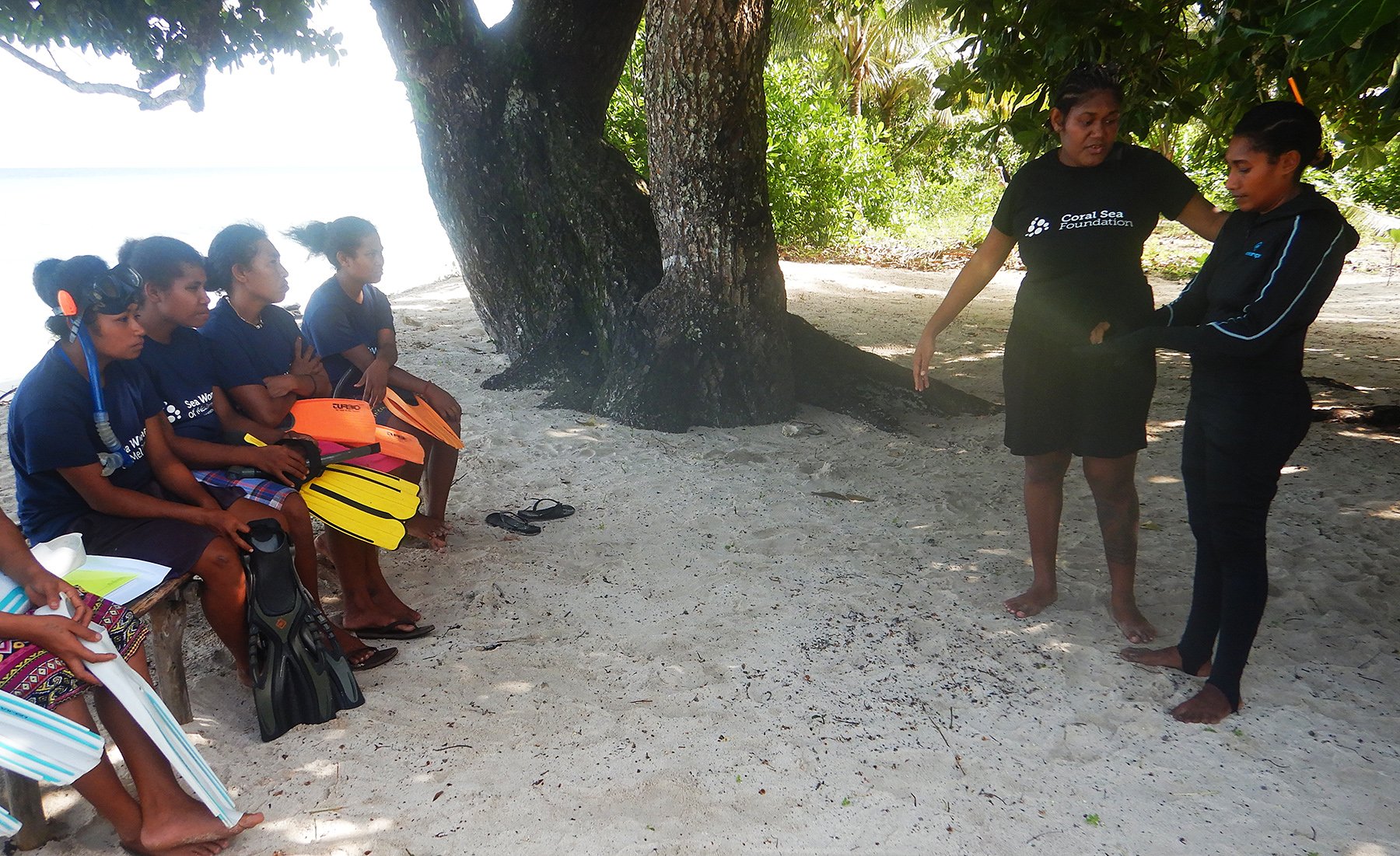
Meet the New MCAF Fellows
Through the Fellows Program, MCAF supports the long-term success of selected conservation leaders through financial and professional support, mentoring, visibility, and community building. In addition to joining the network of fellows, each newly inducted fellow also received funds to support a conservation project. We are thrilled and honored to welcome five visionary and accomplished conservation leaders into the MCAF fellows community.
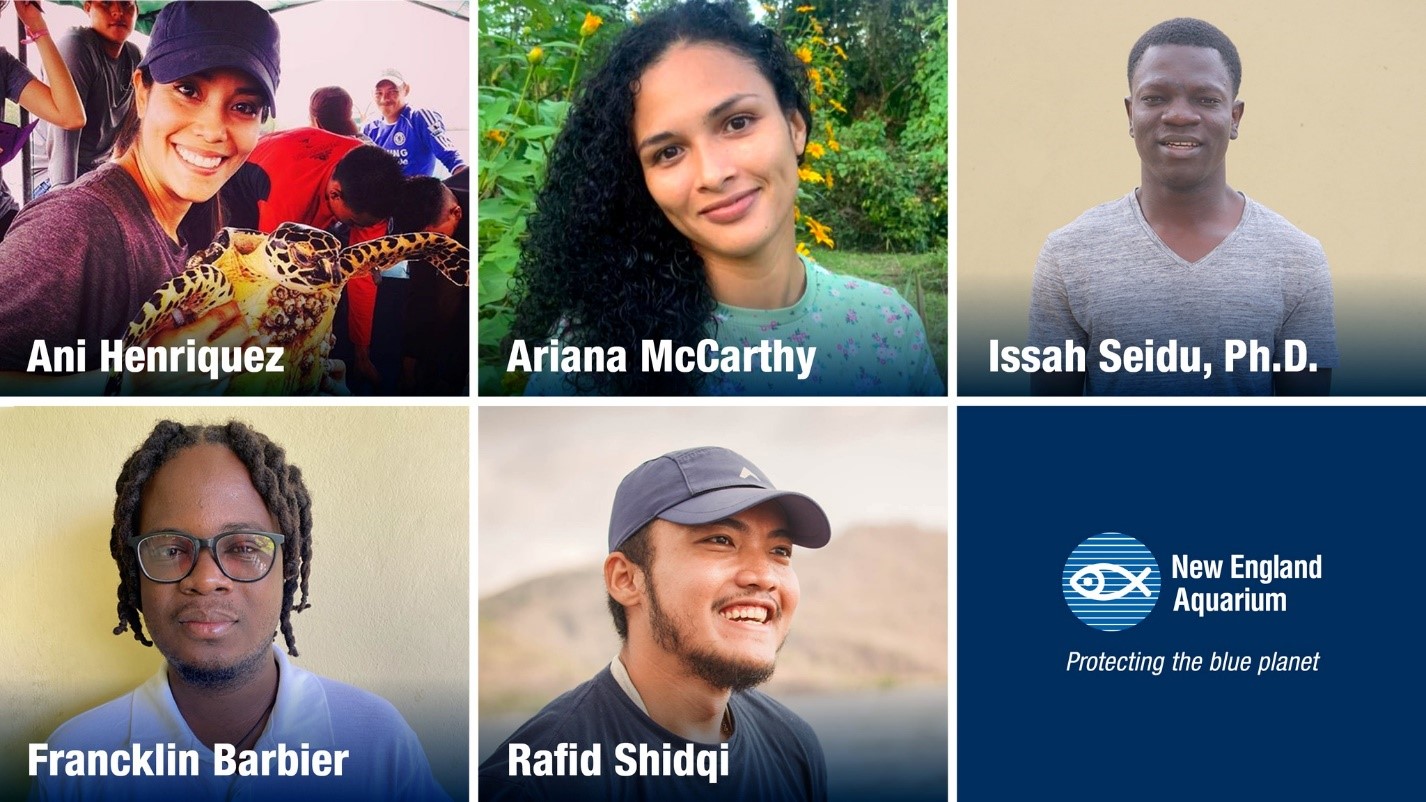
Ani Henriquez is a biologist from El Salvador with a master’s degree in natural protected areas. She is the Executive Director of ProCosta, the first NGO in El Salvador to promote hawksbill turtle conservation. Through her conservation work, Ani partners extensively with local stakeholders, combining her passion for wildlife protection and sustainable community development.
Francklin Barbier is an accomplished Haitian conservationist who was inspired to work on hawksbill and green sea turtle conservation from a young age. Francklin coordinates sea turtle and seabird projects for the Haiti Ocean Project, where he has successfully built partnerships with local fishers and inspired his community to study and protect ocean life.
Dr. Issah Seidu received his Ph.D. in wildlife management from Kwame Nkrumah University of Science and Technology and is the founder of AquaLife Conservancy in Ghana, an organization dedicated to marine and freshwater conservation. Through his research, Issah aims to raise awareness of the conservation needs of shark-like rays and works with local fishers on safe fishing and release methods to increase the survival rate of these species.
After receiving her bachelor’s degree in marine biology from Universidad Nacional de Costa Rica, Ariana Oporta McCarthy co-founded the Coast Rican Alliance for Sea Turtle Conservation and Science (COASTS). She works closely with local citizens in her hometown of Gandoca, Costa Rica, by conducting community-based programs that contribute to the research and conservation of sea turtles.
Rafid Shidqi’s interest in shark and ray conservation began when he volunteered in Lamakera, East Nusa Tenggara, one of the world’s largest manta ray hunting communities. He founded the Thresher Shark Project Indonesia, which seeks to shift the discourse on shark and ray hunting to more sustainable alternatives. Rafid is a strong believer that education, stakeholder engagement, and research are crucial to both community livelihood and conservation. MCAF looks forward to working with Rafid and supporting Thresher Shark Project Indonesia.
For more information on the new MCAF fellows, check out our blog!
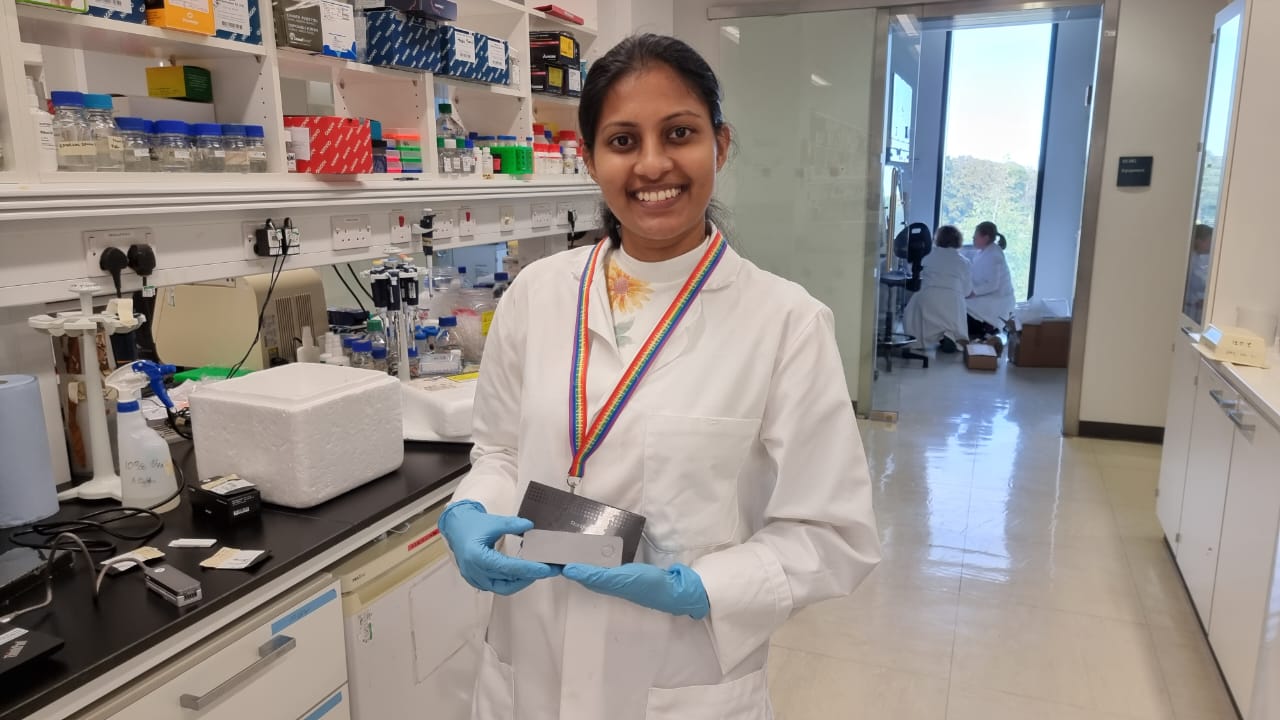
MCAF’s Early Career Ocean Professionals (ECOP) Program Provided Support to Three Emerging Professionals
The ECOP grants are designed to create opportunities for early-career ocean professionals to lead their own projects with support and guidance from a designated mentor.
This year, MCAF was honored to support Diana Seck of the African Aquatic Conservation Fund as part of the ECOP program. She is working to build the first photo-identification catalog for Atlantic humpback dolphins in Senegal, which will help determine several key factors for the successful conservation of these animals. The catalog will include information on abundance and distribution, seasonal habitat use, and long-term threat information for the dolphins.
We were also extremely excited to continue to support Jonathan Trimino of the Crocodile Research Coalition. Jonathan will use his second year of funding to continue researching the impact of pollution on the New River in Belize, using Morelet’s crocodiles as an indicator species.
ECOP Lankika Anjani is conducting groundbreaking research for Blue Resources Trust at their research station in Sri Lanka. Lankika utilizes novel genetic methodology to support the monitoring of threatened elasmobranchs (sharks, rays, and chimeras). Her data will combat the misidentification of species, one of the main threats to shark and ray conservation, by validating the visual identification of specimens at landing sites while enabling the identification of products in trade, such as meat and oil.
MCAF Launches Two New Types of Grants
This year, MCAF launched organizational grants to support the core operations and development of fellows’ organizations in recognition that the health and sustainability of these organizations are critical to achieving lasting positive impacts on ocean conservation and local communities. In 2022, we were extremely excited to issue our first organizational development grant to fellow Anna Oposa and Save Philippine Seas to support the development of a strategic plan among other goals. Fellow Florencia Vilches and the Insituto de Conservacion de Ballenas were also issued a grant to support their core operations and the continuation of cataloging southern right whales in Peninsula Valdes, Argentina. This catalog has demonstrated success in engaging citizen scientists and strengthening the conservation of the Southern Right Whale.
MCAF also launched grants for fellow-led fellowships and mentorship programs to support fellows training the next generation of ocean scientists. MCAF’s first fellow-led fellowship grant supported the Blue Fellowship, or Beca Azul, led by Misión Tiburón in Costa Rica. Beca Azul funds local marine conservation and marine science research projects for advanced students or young professionals, and is an excellent opportunity to develop new ideas and inspire future generations of Costa Rican marine scientists. The fellowship aims to fill in data collection gaps, as well as increase ocean resource management, that is caused by the lack of sufficient economic resources.
Looking Ahead in 2023
We are excited for what 2023 brings and to provide more of these grants to help support project leaders and fellows across the world! Stay tuned for more news from MCAF as we prepare to welcome all 17 MCAF Fellows to Boston for our second global summit to be held in late September of 2023! Read more about our first summit here in our blog post here.
